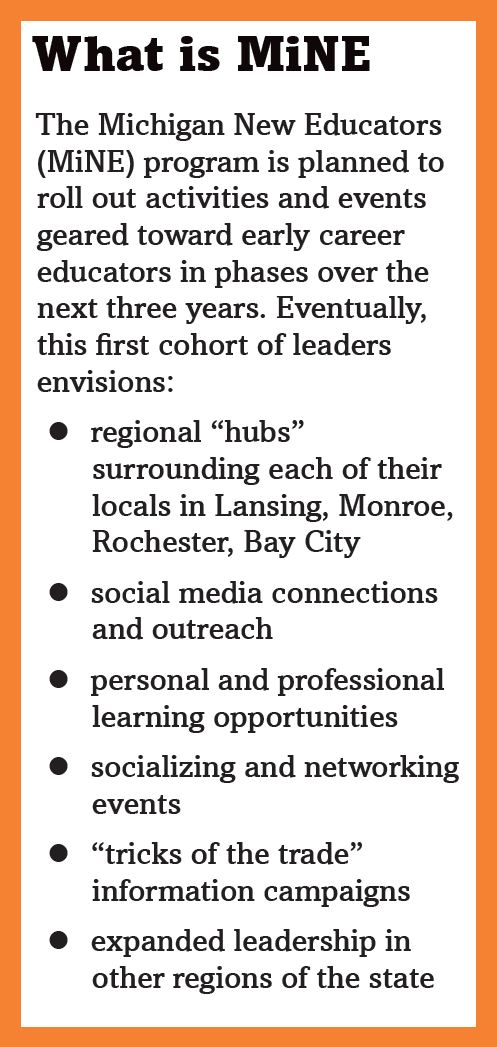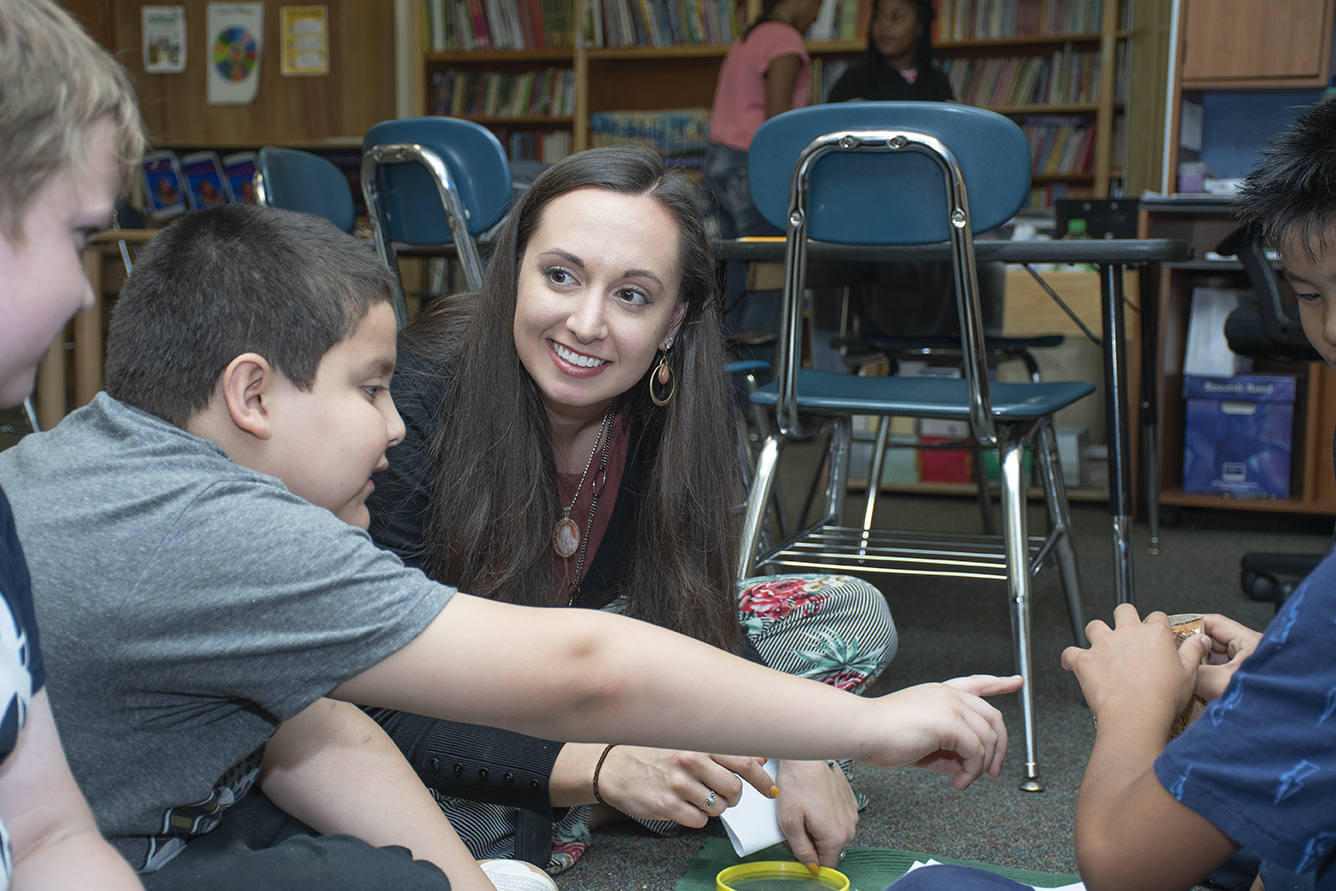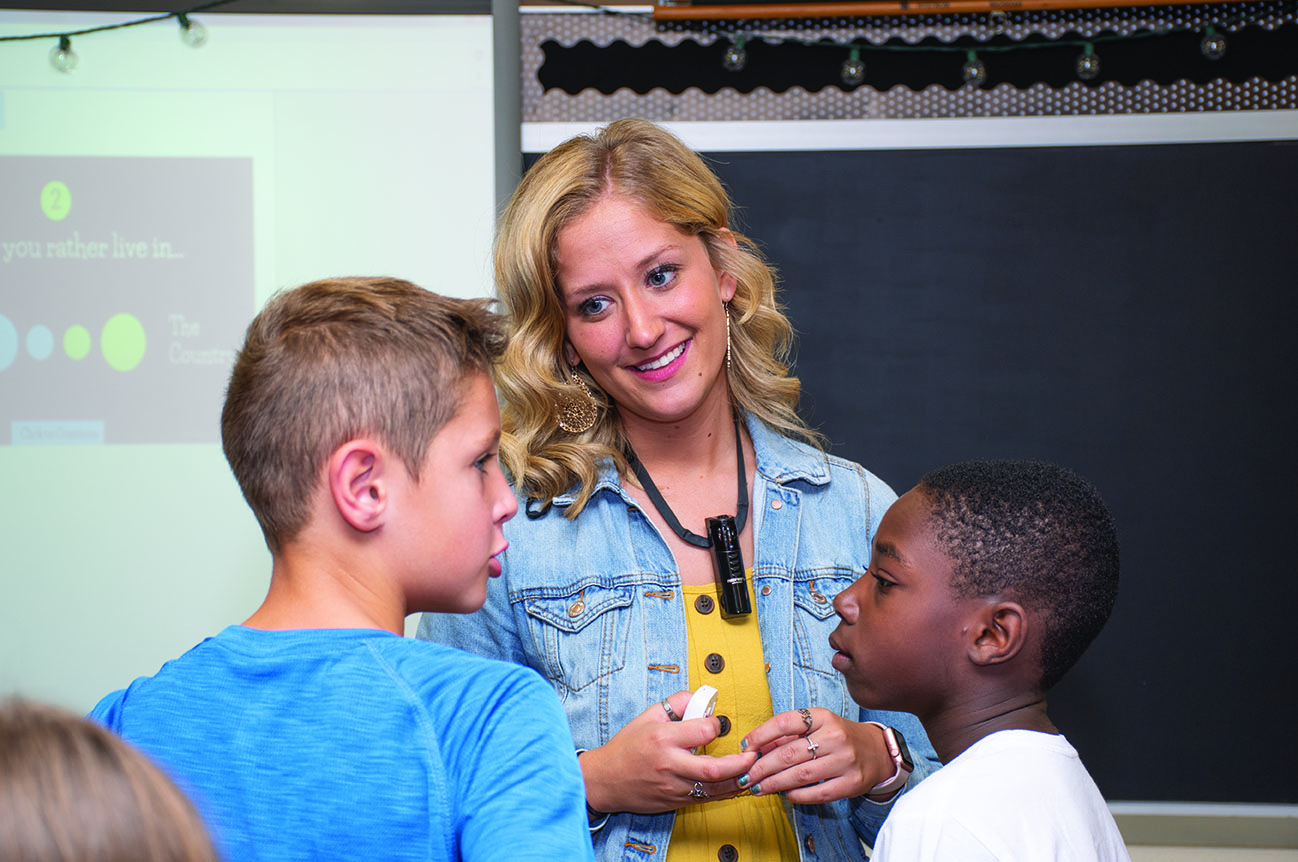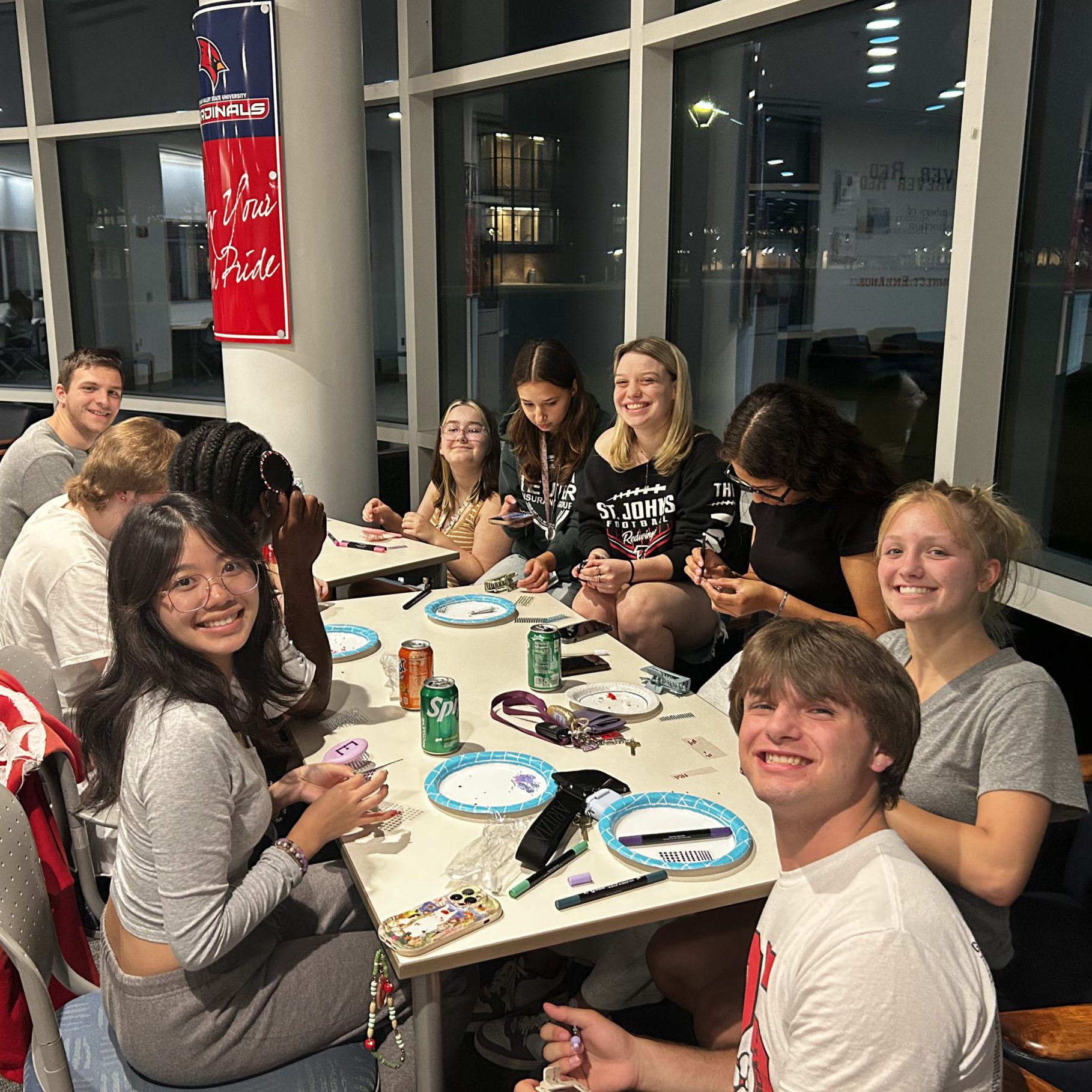This is MiNE!
Early career educators band together to strengthen colleagues and the union
By Brenda Ortega
MEA Voice Editor
For fourth-year educator Danielle Werner, the stress of phoning parents about their child’s misbehavior or lackluster effort is one of the hardest parts of being a new teacher.

“In general, I still don’t even like calling to order pizza!” the Bay City Public Schools teacher quipped.
Werner knows that to survive in the profession, beginning educators must learn how to handle difficult parents. Last year for the first time she followed the advice of a mentor and began calling home with good news, too, so that “It’s not always one kind of call.”
“I didn’t choose this profession to call and complain about kids,” she said. “If only the parents knew—I get no enjoyment out of this; I’m just as stressed as they are. But knowing you’re a professional, holding your ground, finally having that confidence—it comes with time.”
 Unfortunately, for the 44 percent of new teachers who leave the field within the first five years, time is a luxury they don’t have.
Unfortunately, for the 44 percent of new teachers who leave the field within the first five years, time is a luxury they don’t have.
Early career educators need connection and support to thrive in the job—which is the basis of a new MEA initiative starting a three-year rollout. The Michigan New Educators program, known as MiNE, aims to build community around new educators across the state to reduce attrition and empower the next generation of union leaders.
The initiative will work to fill gaps that too many promising educators slip through, said Annette Christiansen, MEA professional issues organizer. “I read somewhere that new teachers decide in October if they’re going to quit at the end of the year. Our job is to not let that happen.”

Bay City’s Werner is one of four early career educators stepping up to leadership roles in the first phase. The four will develop regional “hubs” for programming, networking, and socializing in areas surrounding their locals. More leaders and chapters will be added in the future.
It’s important to have connection with other young professionals whose memories of the challenges are fresh and who haven’t necessarily figured everything out, Werner said.
“The biggest fear as a new educator right now is when you come in, you feel like you have to know everything. And we’re here to say it’s OK to not know everything. I don’t know everything either.”
Werner did figure out the difference between the sounds of a fire alarm and tornado siren at her school—learning the hard way early in her first year. “I took my kids outside for the tornado drill, not knowing which siren was which, and they’re like, ‘Where are we going?’”
She laughs about the mistake now but says it taught her an important lesson: “The people that stay in teaching are the ones that aren’t afraid to ask a lot of questions.”

However, asking for help can feel like an admission of weakness for many beginning educators, said Amanda Henderson, a MiNE leader from Rochester Community Schools who has started her fourth year teaching high school German.
“Especially with Instagram and Pinterest, you want to be the teacher with the perfect classroom and the perfect lesson, and that puts a lot of pressure on people. But this career is all about learning, right? We want students to learn, and good teachers are always learning—whether it’s year 25 or year one.”
As a “traveling” teacher, split between two schools, Henderson experiences unique challenges but feels fortunate to teach in the district where she grew up and graduated—with friends and family nearby, former teachers-turned-colleagues, and other new educators starting out at the same time.
“One of the ways I survived my first year was I had a really strong community. With this MiNE program, it’s important to me to help new teachers find a community of people who have similar struggles or problems or triumphs to be able to share in that together.”

Another priority for Henderson will be finding ways to encourage early career educators to care for themselves, in addition to fretting over students, classrooms, lesson plans, professional development, and grading.
“It’s good to take a break,” she said. “It’s OK to leave on a Friday and leave the papers on the desk; they’ll be there on Monday. And sometimes new teachers need to hear that not every single piece of paper that you hand out to the kids needs to be graded with perfect feedback and put into the grade book. It’s OK to give yourself that grace.”
The MiNE team has talked of doing giveaways to signal the importance of self-care. “I love the saying that you can’t set yourself on fire to keep someone else warm,” Henderson said. “That’s so true with teaching. If you are burned out and exhausted, the kids won’t get what they need.”
They’ve also discussed the possibility of podcasting a talk show with the theme, “Knowing when…” Knowing when to ask for help, call parents, go home, say no, read your contract.
MiNE leader Skye Kapinus is a second-year elementary teacher in Lansing Public Schools who decided to get involved after watching several new educators leave her school last year.
“I was one of four new educators, and they hired more throughout the year, and I was the only one that lasted,” she said. “They leave the field—great teachers—because they’re like, ‘Wow, I can’t handle this stress. I come home crying every day. I can’t handle this anymore.’”
It was her school’s custodians who urged Kapinus to stop staying late every night. “They said, ‘Honey, you’re going to burn yourself out. Go home.’ They would literally kick me out of the school.”
Connect with us!
Facebook.com/MiNewEducators
Twitter @MiNewEducators
And listen to the debut MiNE podcast available on SoundCloud!
 When she came in during a snow day to catch up, a custodian told her, “No. You can’t come in. Go home, get in your PJs, and sit there,” she said, laughing.
When she came in during a snow day to catch up, a custodian told her, “No. You can’t come in. Go home, get in your PJs, and sit there,” she said, laughing.
One of the biggest challenges she would like to address is new educator naiveté. In her first year, she bought her own paper and worked lunch duty for free before learning the district was supposed to supply paper and pay her for working during lunch time.
“I don’t think I ate lunch last year at all,” she said.
This year Kapinus agreed to serve as her MEA building representative, because she came to understand the importance of union camaraderie, support, and expertise. But she found the union wasn’t well explained to younger teachers coming in without awareness of its strengths.
“New teachers don’t understand why they need MEA, so that needs to be explicit,” she said. “The union knows my rights. They’re here to help me. I appreciate the support that you get from being part of a union. You don’t feel so alone.”
Add to that the contracts where the union negotiates everything from class sizes to extra pay requirements, said Brittney Maczala, a MiNE leader and fourth-year elementary teacher from Monroe. “There’s so much the union provides that you don’t even realize,” she said.
For example, in her district, teachers get partial reimbursement for graduate coursework, which is helping her to pursue a Master’s degree.
Maczala learned about the importance of being involved with a union from her dad, a shop steward, so she signed up to join MEA early on and has attended leadership listening tours and national NEA conferences to be an active member.
“It’s so inspiring to see it on the national level and all we’re fighting for,” she said.

All four of this year’s MiNE leaders were recruited to participate through their involvement in events where they met MEA Vice President Chandra Madafferi, whose passion is in building MEA’s capacity to deliver professional development.
“A union is about being a collective, united voice to protect our profession,” Madafferi said. “This is about embracing our profession and owning it essentially, and as young millennials they can help redefine what that looks like.”
One of the biggest concerns for Maczala arose from her first-year experience struggling with severe student behavior issues she hadn’t encountered in her pre-service teaching.
“I didn’t know what supports were in place or who to call, and I had an administrator who was changing jobs, and I didn’t think I had a voice to be able to say, ‘I need help with this. You need to help me.’”
The big tasks of navigating curriculum and assessments added to the sense of overload in that first year as it does for many beginning teachers, Maczala added. The union offers the voice and support that teachers need to make it.
“I think any new educator wants to connect with people that relate to what they’re going through.”
Ultimately, that is the goal of MiNE. Put enough hopeful young educators together and they can change the world, Bay City’s Werner pointed out: “It won’t get better unless we make it better.”
MEA is looking to continue diversifying the new MiNE program during its three-year rollout. We need you! Want to help build a network of connected new educators in your region of the state? For information, contact your local membership chair or Annette Christiansen at achristiansen@mea.org.


